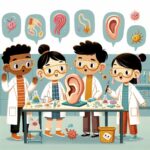Adenoids play a key role in a child’s immune system but can sometimes cause health issues. Understanding the function, potential problems, and treatment options for adenoids is essential for new parents. This guide provides a comprehensive look at adenoids in children, offering valuable knowledge and actionable advice.
What Are Adenoids?
Adenoids are small patches of tissue located at the back of the nasal cavity. They are part of the immune system and help to trap germs that enter the body through the nose, preventing infections. Adenoids are more prominent in children and usually shrink by adolescence.
While adenoids perform a protective role, they can sometimes become swollen or enlarged, leading to health issues. It’s important for parents to recognize the signs of problems with adenoids and know when to seek medical advice.
Common Symptoms of Enlarged Adenoids in Children
Enlarged adenoids can lead to various symptoms, such as difficulty breathing through the nose, snoring, and recurrent ear infections. Parents may also notice their child breathing through their mouth, especially during sleep, which can lead to dry mouth and sore throat. Nasal speech is another indicator of enlarged adenoids.
It’s crucial to observe your child’s symptoms and consult a healthcare provider if you suspect enlarged adenoids. Early intervention can prevent complications and improve your child’s quality of life.
How Are Adenoids Diagnosed and Treated?
Diagnosing adenoids usually involves a physical examination and possibly imaging tests, such as X-rays. In some cases, a doctor may perform a nasal endoscopy to get a closer look at the adenoids.
Treatment for enlarged adenoids depends on the severity of symptoms and may include medication, such as nasal steroids to reduce inflammation, or surgery (adenoidectomy) to remove the adenoids if they cause significant problems or don’t respond to medication. It’s important to discuss treatment options with your healthcare provider to determine the best course of action for your child.
When to Seek Medical Advice for Adenoids
If your child shows symptoms of enlarged adenoids, such as persistent nasal congestion, breathing difficulties, snoring, or recurrent ear infections, it’s time to seek medical advice. Timely consultation with a healthcare provider can lead to an accurate diagnosis and appropriate treatment.
Ignoring symptoms can lead to complications, such as sleep disturbances and impact on your child’s overall health and development. Trust your instincts as a parent and don’t hesitate to seek medical attention if you’re concerned about your child’s health.
Helpful Resources for Parents
For additional information on adenoids and related health issues, visiting trusted medical websites can be beneficial. The American Academy of Otolaryngology-Head and Neck Surgery provides valuable resources and information on adenoids and other ENT concerns ( enthealth.org ).
Furthermore, connecting with online forums and support groups for parents can offer support and share experiences related to children’s health issues, including adenoids.
Understanding adenoids and their impact on children’s health is crucial for new parents. By recognizing symptoms early, consulting healthcare professionals, and exploring treatment options, you can ensure the well-being of your child and address any adenoid-related issues effectively.













